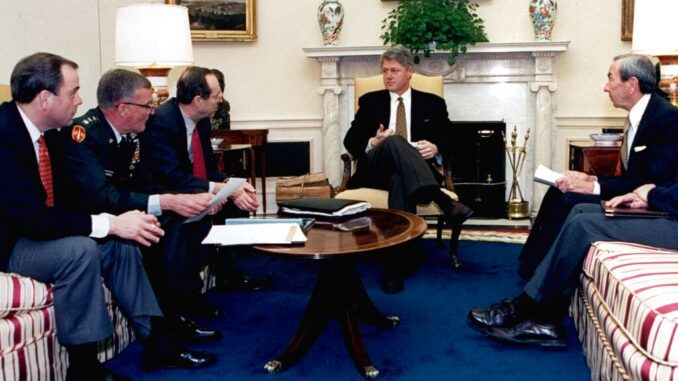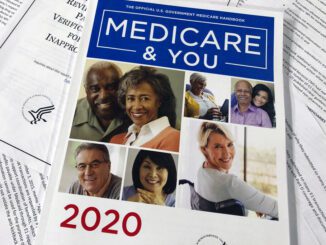
(Article first appeared in the July 25, 2023, edition of Discourse magazine published by the Mercatus Center at George Mason University)
2nd Law: The political party opposing the president is more skeptical of military intervention.
When a president concludes that U.S. national interests require either direct participation in military operations abroad or providing material support to one side of an overseas conflict, vocal opposition to such intervention tends to be concentrated in the opposing political party.
This trend is unsurprising and has obvious origins. The president is the commander-in-chief of the armed forces and is in charge of foreign policy, diplomacy, intelligence gathering and many other national security functions. Trust in the president will nearly always be higher in his own party than in the opposing party. It is thus to be expected that the sharpest criticisms of U.S. military involvements will come from the party that doesn’t hold the White House.
Democrats were the loudest critics of President Ronald Reagan’s prosecution of the Cold War and of both Bushes’ interventions in Iraq. Republicans criticized President Bill Clinton’s management of military operations from Somalia to Kosovo, and what criticism there is of President Joe Biden’s assistance to Ukraine today is concentrated on the Republican side.
A corollary to this law is that the opposition party will be the first to turn against a military action after difficulties are encountered. Congressional support for the October 2002 resolution in favor of military action in Iraq was strongly bipartisan before U.S. forces became mired in ongoing hostilities, after which Democrats rapidly turned against it. Similarly, congressional Republicans rallied around efforts to require Clinton to withdraw forces from Somalia after the disastrous Black Hawk Down operation.
The trend has been pronounced and persistent during presidential administrations of both parties throughout the post-Vietnam era, although it was somewhat muted during the Donald Trump presidency. This was because Trump was exceptionally isolationist among American presidents, skeptical of providing material support even to longstanding U.S. allies. Regardless, it is rare for Congress to call for military intervention where a president is disinclined to go, whereas it frequently happens that a president must sell a military intervention to or around a reluctant Congress.
For this reason, it is especially noteworthy whenever there is public agreement between a president and opposition party leaders on the need for Americans to sacrifice blood and treasure in a military intervention abroad. This only happens when the national security imperative is felt so strongly that it supersedes natural partisan rivalries over the conduct of foreign policy.
3rd Law: Presidents tend to favor free trade more than members of Congress do.
The president is elected to represent the interests of the whole nation. Collectively, Congress also represents the whole of the nation, but individual senators represent only individual states, and individual representatives represent only individual districts. Conflicts can and do arise between the national interest and the sum of local interests, sometimes causing the president and members of Congress to end up on opposite sides — even when they are of the same party.
There are several policy areas in which these conflicting perspectives come into play, but one particularly prominent one is trade policy. Presidents have tended to favor free trade agreements, which (1) reduce costs for U.S. consumers, (2) open markets overseas for U.S. businesses and (3) generally improve the national economic performance by which presidents are judged. However, trade flows can also cause disruptions of employment and wages that are often concentrated locally, resulting in opposition from members of Congress representing the affected districts.
While there are typically differences between the parties over trade, these dynamics also tend to result in differences between presidents and their party allies in Congress. For example, both Clinton and President Barack Obama promoted free trade agreements during their administrations, though they often had to make policy concessions to win the support of Congress. National support for free trade rises and falls with the political winds, but amid these fluctuations there has usually been less support in Congress than in the White House.
It remains to be seen whether this law will function in the future as it has for the past few decades. Trump was a notable exception to the usual rule that presidents promote trade. More broadly, American politics today exhibit stronger left and right wings (which tend to be more skeptical of trade’s benefits) and a weakened political center (which historically has favored free trade). While this law is consistent with most recent political history, the future could certainly be different.
Charles Blahous is the J. Fish and Lillian F. Smith chair and senior research strategist at the Mercatus Center at George Mason University.



